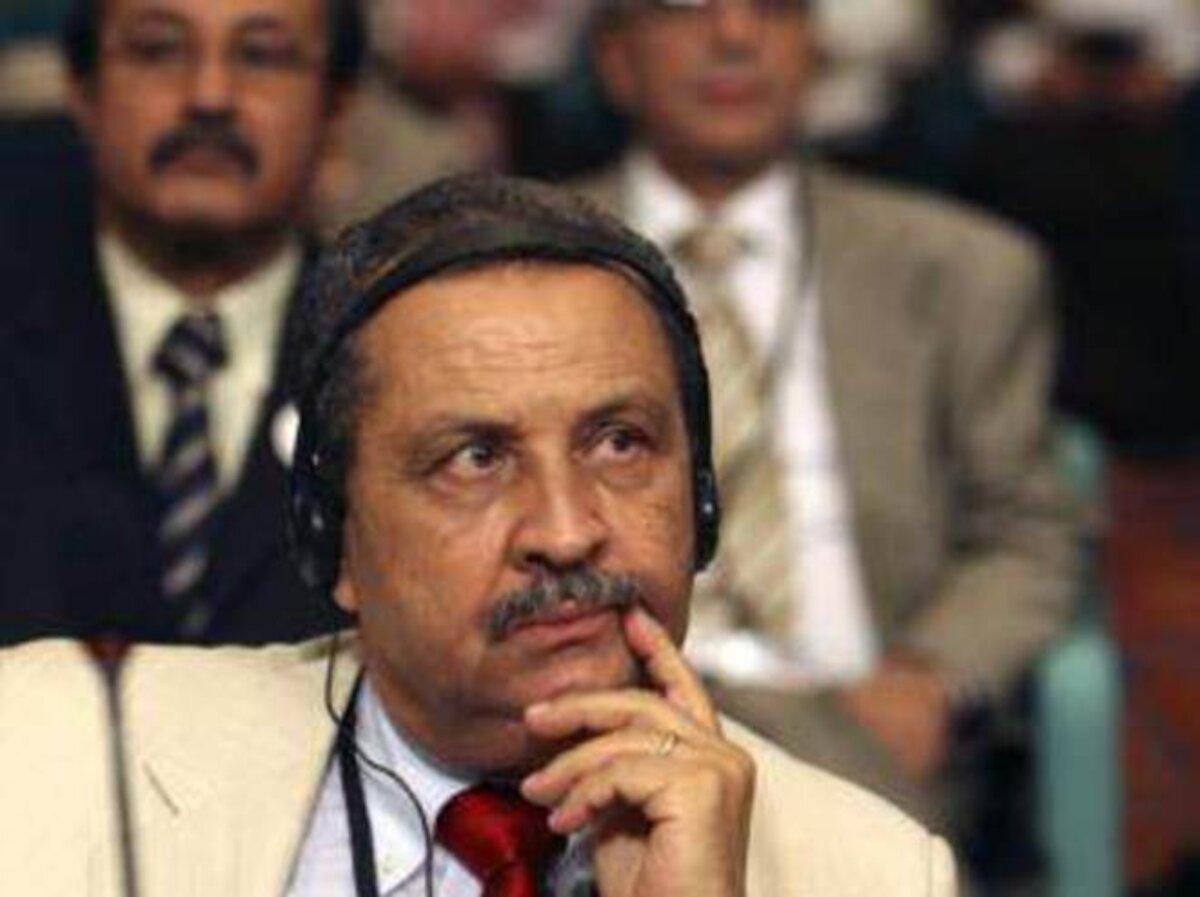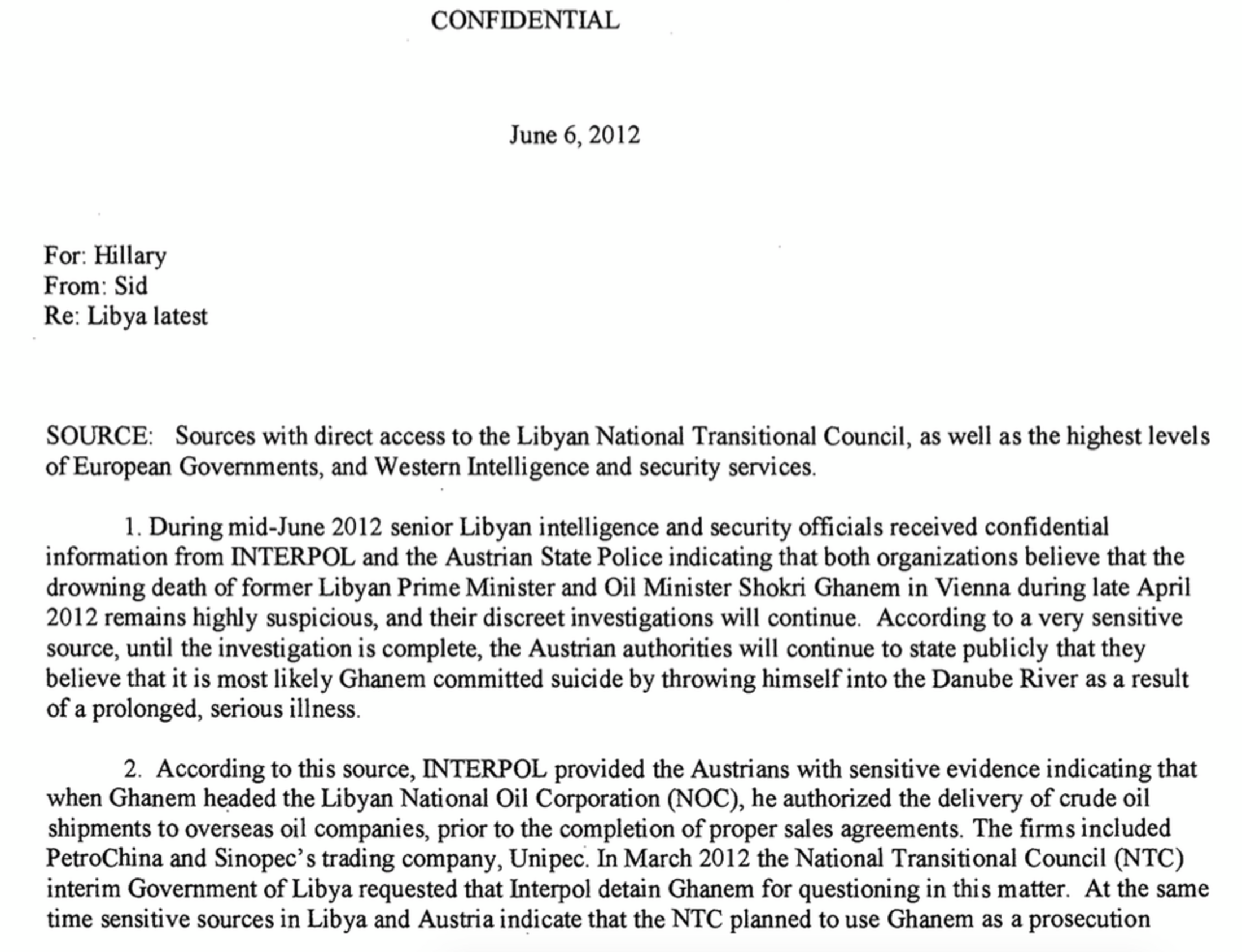“Not one Libyan I have spoken to believes he flung himself into the Danube, or suddenly clutched his heart in pain and slipped silently into the river.” This comment is contained in an email written on June 7th, 2012, by Christopher Stevens, who had just been appointed United States ambassador to Libya, concerning the mysterious “drowning” of Shukri Ghanem in Vienna a month before.
Ghanem, who was 69 at his death, had been a key figure in the Libyan regime of Muammar Gaddafi, serving as prime minister from 2003 to 2006 then as oil minister from 2006 to 2011 before defecting as the regime was overthrown. His sudden death in late April 2012 thus caused a certain stir among the world's governments and secret services, few of whom believed that his death had occurred naturally.

Enlargement : Illustration 1

Mediapart has unearthed several emails hacked from Hillary Clinton's email account which showed that the then-US Secretary of State and the American diplomatic service were raising questions about the nature and cause of Shukri Ghanem's death in 2012. These questions are even more legitimate today after the recent revelation by Mediapart that the Libyan oil minister had kept a notebook in which he recorded details of payments made by the Libyan regime to Nicolas Sarkozy's 2007 election campaign. Those claims of illegal funding are now the subject of an independent judicial investigation in France.
The emails, which can be found on Wikileaks here, include one sent by Clinton's unofficial advisor, Sidney Blumenthal, on June 6th, 2012, which was largely devoted to Shukri Ghanem's mysterious death. The Secretary of State then forwarded the mail onto another advisor, Jake Sullivan, with the comment: “Esp. if you like unsolved crimes.”
Blumenthal's eight-point memo is based on information gathered from “sources with direct access to the Libyan National Transitional Council, as well as the highest levels of European Governments, and Western Intelligence and security services”. In it we learn that Interpol and the Austrian police judged the drowning of the former Libyan minister to be “highly suspicious” and that they had briefed Libyan intelligence and security officials that “their discreet investigations will continue”. The email adds: “According to a very sensitive source, until the investigation is complete, the Austrian authorities will continue to state publicly that they believe that it is most likely Ghanem committed suicide by throwing himself into the Danube River as a result of a prolonged, serious illness.”

Enlargement : Illustration 2

Blumenthal then runs through the different affairs in which Shukri Ghanem had been involved when he headed the National Libyan Oil Corporation (NOC). According to one source, between 2008 and 2010 Ghaem had “authorized the delivery of crude oil shipments to overseas oil companies, prior to the completion of proper sales agreements”. The firms included Chinese energy firms PetroChina and Sinopec, the latter through its trading company Unipec. The memo also points out that Ghanem and Gaddafi's son Saif al-Islam, who had controlled oil affairs in the country, had widely backed the sale of Libyan crude oil at below market value. It was believed by some that “the difference may have been paid by the oil companies into bank accounts other than those controlled by the NOC”.
In March 2012 Libya's National Transitional Council (NTC), which served as the country's provisional government after Gaddafi's fall in 2011, wanted to question Shukri Ghanem about this vast system of embezzling oil profits, which involved colossal sums. The Libyan authorities contacted Interpol to get the former minister arrested, and they wanted him to appear as a witness in Saif al-Islam's trial after the latter's arrest in November 2011.
The Blumenthal memo was later passed on to Christopher Stevens for his opinion. “The [paragraphs] regarding the late Shukri Ghanem ring true to me,” the ambassador responded. “He was close to Saif and was reported to be involved in shady oil trades ... Most believe he was silenced by regime members or else by foreign mafia types,” added Christopher Stevens, who was killed some months later on September 11th, 2012, during an attack on the US Consulate in Benghazi. Another American official consulted was Nathaniel Mason, commercial attaché in Libya, who said: “I would not be surprised if Russian, Eastern European, and Chinese oil companies were involved in kick-back deals.”
Despite all these suspicions – to which one should now add the line of inquiry that Shukri Ghanem was involved in the suspected funding of Sarkozy's election campaign in 2007 – the Austrian investigation ended in February 2013, having concluded that Ghanem died naturally. This was despite the fact that a number of grey areas still surround the circumstances of his death.
'He seemed in good form'

Mediapart has spoken by phone to Amer Albayati, an Iraqi journalist who specialises in terrorist issues and who himself lives in Vienna. He had been in contact with Shukri Ghanem and says he still remains in touch with the dead man's family. “I telephoned him the day before his death, on the Saturday at around 11 a.m. He seemed in good form and we had agreed to see each other the next day for an interview on the general situation in Libya,” says Albayati. “Since his defection lots of foreign journalists had wanted to speak to him but he had always refused and I was planning to offer the interview to the BBC,” he adds.
But when the journalist called back the next day he got Ghanem's daughter who informed him her father was dead, without giving any more details. Amer Albayati then hurriedly called the Austrian news agency APA, and at 5.55 p.m. on the Sunday an initial news report announced Shukri Ghanem's death “at his home”. Less than an hour later the Austrian police denied this information and said that the Libyan's body had in fact been recovered from the River Danube. “I don't know where this muddle came from,” says Albayati. “I know only that I called the journalists at APA to tell them that Shukri Ghanem was dead and that they should ask the police to find out exactly what had happened.”
It was around 8.40 a.m. on Sunday April 29th, 2012, that a passer-by had discovered the Libyan's body floating in the Danube, 20 metres from a Greek restaurant on the Copa Cagrana, a riverfront area where the Viennese like to go for a drink or dinner. Shukri Ghanem had been dressed in a white shirt and jeans, and the body of the “drowned” victim showed “no sign of external violence”. His body had been in the water for no longer than two hours, according to the police. One curious detail was that the former minister had gone out without his papers; he was only identified thanks to a business card with the name of a Vienna company on it.

Enlargement : Illustration 4

Shukri Ghanem knew Vienna very well having visited it on many occasions for meetings of the Organization of the Petroleum Exporting Countries (OPEC), which is based in the Austrian capital. In May 2011 he carried out a timely defection from Libya, two months after French and British military intervention there, and went to live in a luxury apartment on Kratochwjle Strasse in Vienna, which he shared with one of his daughters. But he was to live there for less than a year.
“He knew everything about the oil revenue network in Gaddafi's time, about issues of money and its transfer,” explains Amer Albayati. He thinks the idea that the Libya died “naturally” lacks credibility. “He could have been killed for different reasons, in connection with oil deals which were accompanied by misappropriation, or linked to the bribes which were given to politicians in France, Italy and England,” he says, refusing to say more. The Iraqi journalist points out that until now he had never heard mention of the handwritten notebook in which Shukri Ghanem recorded the millions handed over by the Libyan regime to Nicolas Sarkozy's team in 2007.
Amer Albayati says that Ghanem had continued his business affairs while in exile in Vienna and that his business “was doing well”. He explains: “At the time when he was a minister Shukri Ghanem had helped set up First Energy Bank, an Islamic bank based in Bahrain.” Just before the fall of the Gaddafi regime in 2011 Libya held a 16% share in the institution. Today its website reveals that Mohamed Shukri Ghanem, the late oil minister's son, is the bank's chief executive officer. “Mohamed knew nothing about his father's business affairs and today, like the rest of the family, he is frightened,” says Amer Albayati.
Did Shukri Ghanem himself feel threatened? “He had become very cautious,” says Albayati. “He never criticised Gaddafi and his family and he sometimes became tense when he saw a person of Arab appearance in the street. When I saw him it was always close to his building, in Donaupark,” says the Iraqi journalist, who says he was unaware of any health problem as far as Ghanem was concerned. On the contrary the Libyan had a “strong appetite for life and for women”.
The Austrian media have outlined Shukri Ghanem's final hours without going into much detail. Around 10 p.m. on Saturday April 28th, 2012, he said goodnight to his daughter, with whom he had been watching television, saying that he was going to bed because he was very tired. But he got up at dawn, which was not part of his late-rising routine, and set off towards the waterfront.
Initially the Austrian police considered the death as a possible crime. But on July 10th, 2012, the final post-mortem examination report, revealed by the newspaper Kurier, concluded that the death had been a “natural” one. It was suggested that Shukri Ghanem had been taken ill with a “heart attack” which had thrown him into the water, where he drowned after trying to come up for air on two occasions. No one in the area saw or heard anything.
The much-awaited toxicology report showed nothing unusual apart from “high concentrations of nicotine and caffeine” in the Libyan's blood. It was not possible to probe further into the issue as Ghanem's body had been taken back to Tripoli on May 4th, 2012, where he was discreetly buried by his family.
-----------------------------------------------------------------------------------------
- The French version of this article can be found here.
English version by Michael Streeter



